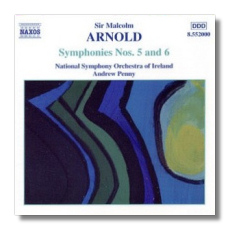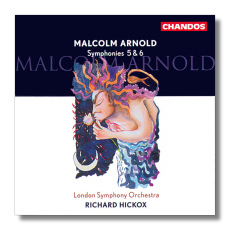
The Internet's Premier Classical Music Source
Related Links
- Arnold Reviews
- Latest Reviews
- More Reviews
-
By Composer
-
Collections
DVD & Blu-ray
Books
Concert Reviews
Articles/Interviews
Software
Audio
Search Amazon
Recommended Links
Site News
 CD Review
CD Review
Malcolm Arnold

Symphonies #5 & 6
- Symphony #5, Op. 74
- Symphony #6, Op. 95
National Symphony Orchestra of Ireland/Andrew Penny
Naxos 52000


- Symphony #5, Op. 74
- Symphony #6, Op. 95
London Symphony Orchestra/Richard Hickox
Chandos 9385
You know, often I am writing a review as I am discovering the music I am writing about. This has been the case with the Arnold cycle. I have been diagnosed as being bipolar. Some people call this a disease. When I listen to Arnold's music the word that appears most often in all of my notes is "bi". His symphonies share a trait of hitting your senses with jumps from A to B that soar. The next word that has the most frequent use is "Martinů".
One of the things I realized after the meds took effect is that all those years I was misdiagnosed I was angry. I was angry all the time. The overriding sense I get from listening to Arnold's symphonies is that this guy is angry. I don't mean to give you the impression that this essay is about me. No, rather it is an attempt to describe to you how the composer's symphonies mean. I have studied and am studying all of them. I have gotten copies of alternative recordings and listened to them as part of that studying. Arnold gives me the feeling that he is angry about something. This sense comes no matter which recording I am listening to.
If you haven't read my previous reports on Arnold, I will tell you that I am finding his symphonies to be a wonderful learning experience. I am going to make an attempt to tell you what I have learned about these symphonies by studying two different recordings and reading the notes.
I will start with the 6th because I want to. In both recordings I can feel a sense of sitting in a jazz club and listening to a quartet. In the notes I had read that Arnold said he was trying to capture the improvisational aspect he heard in Charlie Parker. In my first few listenings I didn't get it. Then, like an epiphany, I heard it. Once you are aware, nothing is the same. The Chandos recording gives this movement a sense of a jazz quartet, but something you might hear in a Twilight Zone episode. The Penny recording offers sharper brass attacks, a more 'jazzy' feel to the music, less movie. I like both perspectives but found the Naxos recording more involving. The quantity of my notes as I was free writing exploded when listening to the Naxos recording.
The Fifth Symphony brings to mind Sibelius' 4th. The opening clarinet solo is one thing that does that. The use of chimes and tubular bells is another reason. The first movement is intense, it is a swing of emotions: violent, anger, sorrow, and tenderness. It is, quite frankly, one of the most interesting musical experiences I have had. At one point Arnold kind of quotes the Dies Irae but instead of going bup, bup, bup, bup, (then down ) bub, bub, bup, bup Arnold goes bup, bup bup bup… and then repeats it instead of going down. Now, I sure hope you staid with me on that one and will tell me what I said. The intensity, the taut sense of anticipation that closes the first movement is melts away as the second movement opens. It is a sense of release. Turbulence is also in the movement, as it is in all his works. I won't go on, the notes do a credible if somewhat technical discussion of the symphonies.
As to the recordings? Well, Penny's sparer, starker sound is more interesting than the LSO, MGM sound. While Hickox and his orchestra do offer an alternative version, which is important so that you have a concept of a piece of music and not just an example, I must be honest and tell you that the Naxos recording is superior and so is the interpretation. The Chandos is a re-release and at mid price. I suggest you get both and will be interested if your listening experience is different from mine.
Copyright © 2002, Robert Stumpf II


















